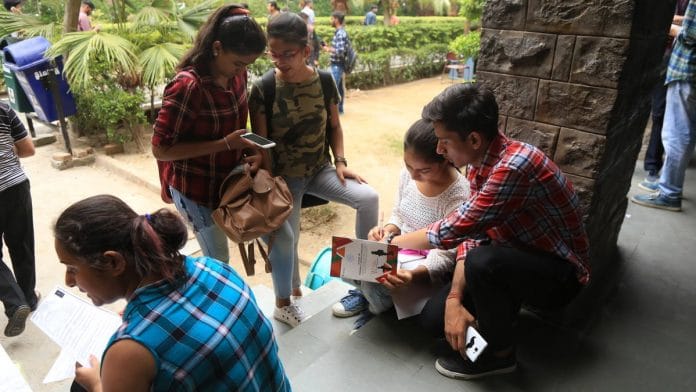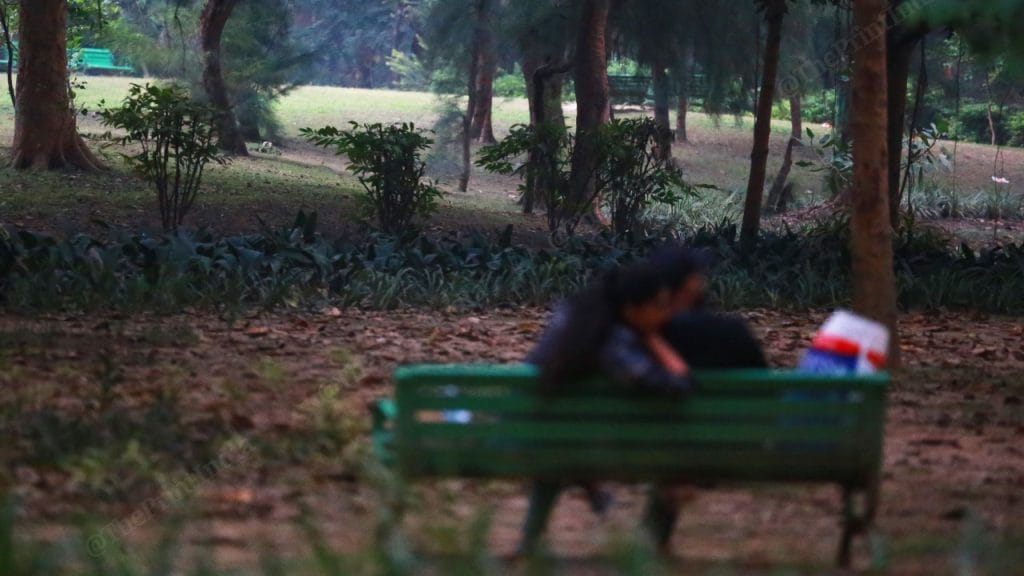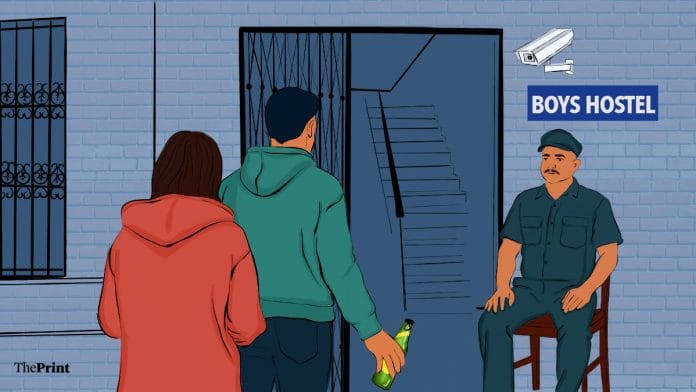Delhi: A Delhi University first year student knocked on every door — friends’ flats, shady motels, even empty classrooms. Nothing worked. Too full, too expensive, too risky. His girlfriend had proposed sex, and he was scraping the bottom for options. With just Rs 6,000 in monthly pocket money, he did what many young lovers in India do: struck a deal. One bottle of Kingfisher beer for the guard, and his girlfriend was in the boys’ hostel.
A recent viral video, showing a Jindal University student being unzipped from a suitcase her boyfriend had supposedly used to smuggle her out of the hostel, has opened public conversations about sexual freedom, campus culture, and restrictions.
It calls for a lot of student ingenuity and hustle.
“One beer is what I could afford. And like this, I’ve sneaked her in four times in the last five months. Where else can we go?” asked a 20-year-old Delhi University student from Chhattisgarh.
That question—Where else can we go?—points at the larger dilemma faced by students across Indian universities. They are torn between desire, moral policing, and the ever-watchful campus.
“Stop this moral policing. Let girls and boys meet openly. They are not doing anything wrong,” said one comment under the viral ‘girl in suitcase’ video from Jindal University.

Young couples have long resorted to jugaad — smuggling in lovers, scaling hostel walls, necking behind campus bushes, bribing guards. This isn’t new. It has played out across generations. What has changed is the scale of surveillance and the tightening of rules. With rigid hostel curfews, CCTVs in every cosy corner, and no money for motels, students now navigate desire with a mix of desperation and innovation. They’ve carved out a new world of situationships, hook-ups, and nanoships, but the space to act on it keeps shrinking.
Entrepreneurs have been quick to catch on. The success of OYO, in fact, was built on its willingness to offer rooms to unmarried couples without the usual hassle over IDs, and on an hourly basis. Areas around DU Campus, such as Malka Ganj, Vijay Nagar, GTB Nagar, and Mukherjee Nagar, are dotted with OYOs and rental rooms catering to young couples. But even here, a drift toward policing has begun. OYO has introduced a new policy in some locations, asking couples to provide “valid proof of their relationship” at check-in.
Some DU students are now building a campaign for unisex hostels, where boys and girls can mingle without censure.
“A co-ed dorm at DU is the need of the hour. It would give boys and girls a safe, dignified space to meet — without the stress of sneaking around or flouting rules,” said Shaurya Vikram, a law student.
What’s different now is the fading of old-school shame. Women are no longer coy about wanting sex. And men — long taught that desire only belonged to them — are learning to catch up. What they all want is more space, privacy, and infrastructural support to assert their right to be intimate. Their small acts of rebellion are more than an adrenaline rush. They are a cry for change.
She directly asked, ‘You don’t want to have sex with me?’ I was flushed. I feebly responded with a yes, and then, she asked me to arrange a room
-DU student from Chhattisgarh
This generation of students wants sex to be discussed openly, accepted, normalised. They want campus healthcare to acknowledge the need for contraceptives, gender sensitisation sessions, and open discussions about consent and safe sex.
What they are up against are authorities obsessed with securing women students by curtailing their mobility on campus after dark.
“Women’s security is equally important. You never know when consent turn into sexual harassment and then blame will shift onto the university,” said a professor at DU, on the condition of anonymity.
It is a tug-of-war between desire and discipline. In 2016, JNU hostels were raided after Gyandev Ahuja, a BJP MLA from Rajasthan, painted a picture of unchecked Bacchanalia on campus. He alleged that 50,000 pieces of bones, 3,000 used condoms, 500 used abortion injections, and 10,000 cigarette butts were found there and that girls and boys “danced naked” in cultural programmes.
His comments sparked outrage, but also laid bare a sexual revolution underway on Indian campuses and the public anxieties around it.

Around the same time, in August 2015, a protest in Jamia Milia Islamia against a more restrictive curfew for women spread across universities. It also led to the formation of the feminist collective Pinjra Tod (Break the Cage), which advocates against using ‘safety’ as a cover to surveil and restrict women. Over time, it has evolved into a broader critique of how universities attempt to police women’s bodies and autonomy.
“One thing I think has changed over generations is that women are more willing to acknowledge wanting sex,” said practising psychoanalyst Amrita Narayanan, author of the book Women’s Sexuality and Modern India: In a Rapture of Distress. “The other thing that has changed is that women are more comfortable with dressing in a way that they consider sexually attractive or even provocative. So, the whole signalling process has become more comfortable.”
But even as expressions shift, old stubborn ways of looking at youth sexuality remain. Surveillance continues, gossip spreads quickly, and the fear of reputational damage — especially for young women — still looms large.
“Anxiety about whispers, about being ‘cancelled’, and about how others think of them seems just as powerful and effective as it was decades ago,” Narayanan added.
Some women smuggle their boyfriends into hostels or PGs disguised in burkhas or salwar-kameez suits. Others wait for the perfect moment — a distracted guard, a CCTV blind spot — to pull off their brief, stolen rendezvous.
Also Read: Live-in couples in small town India have it rough – Varanasi to Vadodara, Aligarh to Alwar
Love where the walls have eyes
For the 20-year-old student from a remote village in Chhattisgarh, getting into a Delhi University college was a dream come true. And then, he met his first girlfriend, a girl from Uttar Pradesh. Love bloomed quietly in the chaos of campus life. He’d accompany her to Sarojini and Janpath to buy clothes, treat her to momos with his frugal pocket money, and linger outside her hostel just to catch a glimpse of her.
He says he was too shy to bring up sex — until she did.
“She directly asked, ‘You don’t want to have sex with me?’ I was flushed. I feebly responded with a yes, and then, she asked me to arrange a room,” he recalled.
What followed was two weeks of convincing her that the boys’ hostel was the only safe option. At the same time, he began building a slow rapport with the night guard. Daily hellos turned into small talk, then buying him chowmein, checking on his health, handing over cigarettes. Finally, one night, he asked the guard for his help. The guard agreed and quoted his price: a bottle of beer.
Those who build the external structures of colleges — and make the rules about how these buildings are to be used, including restrictions on sexual freedom — are very much guided by the internal structures of patriarchy themselves
-Amrita Narayanan, psychoanalyst and author
Under the cover of dark, he ushered her in. She wore a cap, shirt, and jeans, and even tried to mimic a masculine amble in case there were prying eyes. The couple didn’t have much time—the guard had asked for them to sneak out at 4 in the morning so they’d be less likely to get caught. They set alarms on their phones but neither slept a wink that night.
“The adrenaline rush was quite high, not because of the intimacy but the entire process to reach there,” said the 20-year-old, laughing. The next morning, the girl sneaked out and the lectures that day were all about winking and smiling mischievously at each other.
Liberal arts campuses across India — from DU to JNU, Ashoka, and OP Jindal — are full of students from small towns testing new freedoms, far away from parental authority. Many are experiencing some degree of romantic and sexual autonomy for the first time.

But with money usually too scarce to rent a room, they have to use their wits. Some women smuggle their boyfriends into hostels or PGs disguised in burkhas or salwar-kameez suits. Others wait for the perfect moment — a distracted guard, a CCTV blind spot — to pull off their brief, stolen rendezvous.
And that’s where campus curfews, tall, guarded hostel gates and segregation of boys and girls come in.
For Narayanan, campus infrastructure is deeply tied to the internal architecture of patriarchy.
“Those who build the external structures of colleges — and make the rules about how these buildings are to be used, including restrictions on sexual freedom — are very much guided by the internal structures of patriarchy themselves,” she said.
For Nivedita Menon, writer and professor of political thought at JNU, the battle over sexual freedom on campus is tied to the state’s increasing clampdown on relationships outside marriage.
Less support, more moral science
For 27-year-old Vikram, a law student at Delhi University, finding a place was never a problem. He lives in the hostel, but since he comes from a wealthy family, he also rents a flat. Whenever he wanted to meet his girlfriend, he’d retreat to the apartment, sometimes for days, even weeks.
“I understand my privilege. So, I would also help my friends when they wanted a room,” he says, sitting under a banyan tree at the University campus.
Now, Vikram and his friends are pushing for unisex hostels, where students of all genders can live together, with a clear set of rules.
“Universities spend so many resources on building separate hostels, yet they refuse to acknowledge the collective awakening around gender,” he said. “Co-ed dorms could actually reflect a more modern, progressive, and queer-inclusive space.”

Vikram rued that such a dorm could have been built when the boys’ hostel of Hindu College was recently demolished and rebuilt.
“It was a lost opportunity,” Vikram said. “There’s no culture of involving students in such decisions. So how do you expect truly progressive ideas to emerge?”
But sexual freedom is about more than just engaging in intimacy. It’s about consent, the right to make informed choices, and the ability to access contraception and healthcare without fear of stigma.
Mahina Fatima, 28, a PhD student and member of the Internal Complaints Committee at DU, said she routinely hears cases where students didn’t realise they were violating consent. Often, this stems from lack of awareness.
“Gender sensitisation is lacking in Delhi University. Students don’t understand consent and contraception. And they are not even taught,” said Fatima, as a group of students nodded in agreement.
“It’s always women. We carry the burden of sex. We have curfews. As if men don’t need women to have sex with
-19-year-old DU student in a ‘situationship’
And then there is another problem: a shame-filled hush envelopes discussing sexual life. Fatima said even campus healthcare centres engage in moral policing of women.
“Women cannot go to the healthcare centres here and say, ‘We had unprotected sex and now, what can we do about it?’ They are afraid that their parents will be told,” she added.
A 19-year-old student recalled how, after having sex for the first time, she was terrified that the condom might have broken midway. When she missed her period, she went to the healthcare centre. The nurse looked her up and down and said, “Galat cheezein karoge toh yehi hoga” (If you do the wrong things, this is what will happen).
Two months ago, when Fatima went to her college, she found that a thicket of lush green vines had been chopped off. That spot had been a discreet place for couples to make out.
When Fatima asked a professor why, they whispered in her ear, “Students used to engage in that, and that’s why.” That was left for Fatima to interpret.
College students are treated like school children on campuses. Just last week, while Vikram was attending a law lecture, the professor paused mid-way when a girl whispered something to the boy sitting next to her.
“What are you guys doing? Why are you sitting so close? Want to date? Go outside and do it,” the professor scolded, loud enough for the whole class to hear.

“This tells us a lot about the scrutiny with which universities, colleges, and professors continue to monitor and often shame expressions of intimacy between students,” Vikram said.
For Nivedita Menon, writer and professor of political thought at JNU, the battle over sexual freedom on campus is tied to the state’s increasing clampdown on relationships outside marriage. She located the issue of free campus life in the larger context of social and political conservatism.
“We are witnessing a time when the state is clamping down completely on non-marriage-like relations, or rather, on non-legitimate marriage-like relations,” she said.
The Uttarakhand Uniform Civil Code, which came into effect earlier this year, is a case in point. Live-in relationships now have to be registered in the state, and couples who fail to do so risk a fine or even jail time.
“We know through the Uttarakhand Uniform Civil Code that this kind of law is going to be passed in every BJP-ruled state. And so, the question of having sex outside legitimate marriage — which means no inter-caste, no inter-community, only fully conventional marriage — will be criminalised,” Menon added.
At Ashoka University, a student who’d heard the Jindal story recalled one of her own daring moments. Having sneaked into her boyfriend’s hostel room, she peed in a bottle to avoid venturing out and being seen.
Also Read: Rationalists look for love in new India. Kerala’s Secular Matrimony swipes left on religion
Sex, shame, and situationships
It was a battle between morality, shame, and pleasure. And for a 21-year-old student from Hindu College, pleasure won. She went out with the boy she found cutest on campus. And the rules of their relationship were laid down early on: no emotional bond, just a dignified sexual relationship with no promises of longevity.
“It’s not that I don’t want emotions. I just don’t want to be turned down for showing the emotional, vulnerable side of me. That’s more painful,” she said with a quiet chuckle.
Her PG was never an option. It had CCTV surveillance from the entrance to the corridors, and if anyone sneaked in, parents were quickly alerted. The boys’ PG was less daunting. There was a guard but no CCTV. So that’s where she’d go to meet her boyfriend, slipping in while his friends distracted the guard.
She calls it a “situationship” — one step short of a relationship, more than just friendship. But choosing such a relationship didn’t come easy to her. Before she started strategising about bypassing surveillance, she had to confront the internalised shame and morality that shadowed her desire.
“I may call myself a new-age girl, but I was raised in a deeply conservative household. Ideas of shame, control, and good character were drilled into me from the start,” she said, as she puffed a cigarette dangling between her thick fingers.
And yet, she sees a very thin line between her parental patriarchy, campus surveillance, and the new state policies.
“Isn’t that bizarre? Who I sleep with, talk to, and choose to love will become the state’s business. It’ll be apocalyptic,” she says.
Her worry goes beyond surveillance — it’s about who will bear the consequences, who will be the victim of such high-end moral policing.
“It’s always women. We carry the burden of sex. We have curfews. As if men don’t need women to have sex with,” she said bitterly.
For Naryanan, women like her represent the first stirrings of something hopeful.
“There are small pockets — not very big, but they’re the beginnings of affirmation — for women who are exercising sexual freedom. And that’s what we need more of,” she said. “Affirmation is the opposite of negative gossip and anxiety.”
Across Delhi-NCR university campuses, the Jindal University suitcase story has become folklore. Even though the university has claimed that it was actually just a prank, the sneaking-in-for-sex angle still speaks to students.
A Jindal University student told ThePrint that the campus is actually less restrictive than others, albeit with rules in place.
“The pharmacy on campus sells contraceptives and young boys and girls buy them from them,” she said.
At Ashoka University, a student who’d heard the Jindal story recalled one of her own daring moments. She had sneaked into her boyfriend’s room after the cross-entry gates had closed. She couldn’t move about openly to go to the toilet and she couldn’t go back to her girls’ hostel. So she did what she had to: she peed in a bottle, sitting in the privacy of his room.
“It was my act of defiance,” she laughed.
The Jindal University saga has now entered lovers’ banter in other campuses.
The girlfriend of the 20-year-old Delhi University student has been asking him the same question relentlessly: Will you also zip me in a trolley and take me to your boys’ hostel?
He has a standard reply: “You are my girl. I will never do anything to hurt you. I will bribe a guard with two Kingfishers this time.”
(Edited by Asavari Singh)







Parents must modernise. Their insistence on their wards staying in college/university hostels is the crux of the issue. Hostels have very restrictive rules, even more so for women.
The urban middle class parents can obviously afford to let their wards stay in rented accommodation. The children can have ample scope for enjoying intimacy in the safe and secure space of their own rented flat.
Also, sex education must be made mandatory in schools. Children must be educated about safe sex practices.
College and university authorities must not act against students seeking intimacy. Rather they must act as facilitators for such students and assist them in finding safe spaces where they can enjoy intimacy.
Parents and teachers/professors must evolve with time. Instead of discouraging sex, they must encourage it. A starting point can be the removal of all CCTV cameras from college premises. This would ensure ample safe space for necking and canoodling, if not sex.
The best part of this article was the fact that the girl asked for sex. The Chattisgarh guy could not even manage to bring up the topic, but the girl took the initiative. Such bold and sexually liberated girls must be encouraged and praised. They will bring about a revolution in Indian society.
I can relate to Vikram’s experience.
I too had the privilege of renting a flat during college and therefore could enjoy life. Most of my friends used to have their rendezvous at my place. So much so that I earned quite a reputation at college. Unfortunately, some of them (or rather their partners) were in the habit of making loud sounds during “the act”. Neighbours, at times, used to get pissed.
Heartfelt thanks to the journalist for addressing this very serious issue.
I was in a relationship with my neighbouring aunty. She was married with two kids. It was really tough to get privacy. We would be yearning for days for some intimacy.
OYO was like a God sent for us. Ritesh Agarwal is an angel and I will always be thankful to him.
The government must mandate that every institution of higher education should have an on-campus “guest house”. Where students wanting to have sex can get a room at subsidised rates. This would ensure that those with very little pocket money can afford a private space to enjoy with their partners. Also, being on-campus and administered by the institute would guarantee safety and security. The “guest house” should ideally have a condom vending machine too and promote safe sex practices. This would also generate much needed revenue for the college/university.
The parents should open up their homes too. Why would they want their son or daughter to have sex in a dingy and unsafe OYO room? The parents can always accommodate their children and their sex partners in their own home. In fact, parents must encourage their children to come home with their partners and have a good time.
As has been commented by some others, this generation is hungry for intimacy and getting a safe and secure space to do it poses a serious challenge. The government, the college authorities and the parents should co-ordinate amongst themselves to create an environment where college/university students can get ample amount of intimacy in a safe and secure way.
thank you for covering this topic
Thank you for covering this topic.
Shameful indeed!
Ms. Sagarika Kissu interviews and quotes Prof. Nivedita Menon – an academic whose anti-Hindu and anti-India tirades are available on Youtube for everyone to see. Over the years Prof. Menon has been thoroughly exposed for what she truly is – a privileged hypocrite in an unrelenting quest for vilifying and denigrating Hindus. Her hatred for Hindus knows no bounds. Neither does her contempt for the Indian nation.
Menon can be best described as a Pakistani asset operating out of India.
We have mastered the art of traveling backwards. I am not sure how on earth a state could pass a law to make it mandatory to register if two adults choose to stay together. And no one seems to have any problem with it? How is this not an invasion of privacy? And how on earth can any hotel chain insist on proof of marriage? Why should it be anybody’s problem if one goes with one’s married partner or someone else?! The irony is we say 18 year olds are mature enough to choose the ones to lead the country but cant choose what they do with another consenting adult!
A pathetic society is what we seem to be becoming.